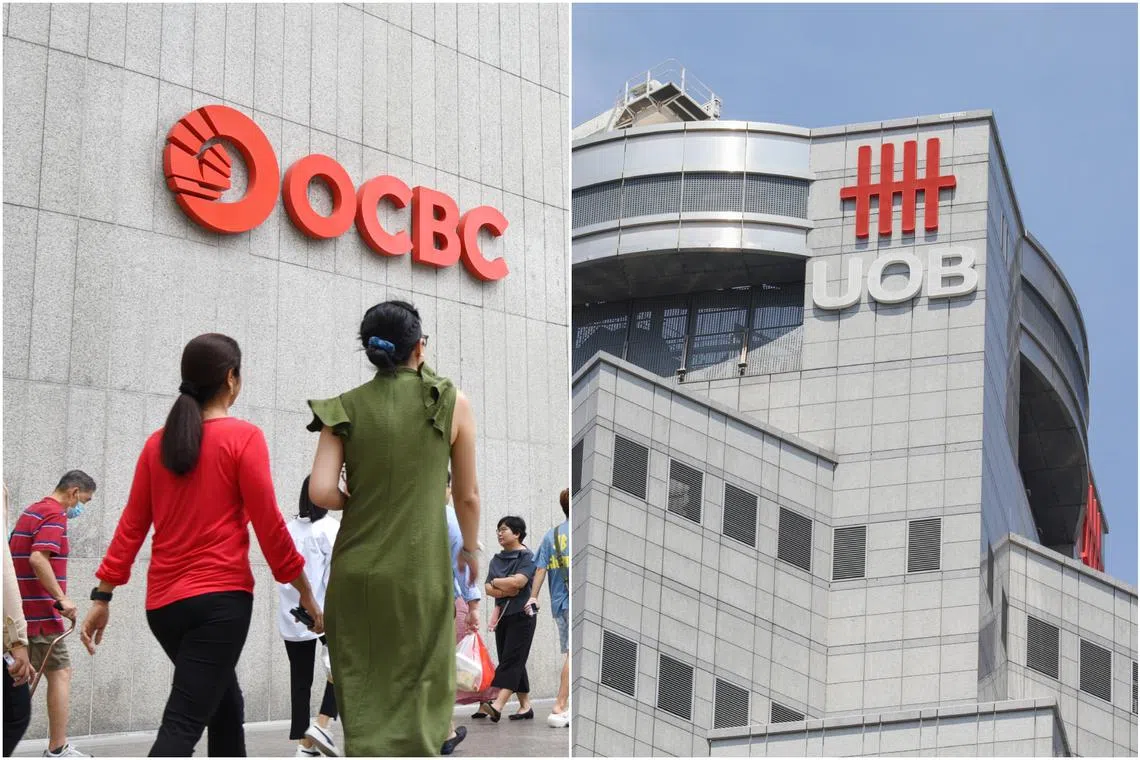UOB and OCBC junior staff to receive one-off payments to cope with cost of living
Sign up now: Get ST's newsletters delivered to your inbox

OCBC employees are expected to receive their $1,000 payout between February and April 2025, while UOB employees can expect to receive a one-off extra month of bonus, to be paid out by April 2025.
ST PHOTOS: HENG YI-HSIN, LUTHER LAU
Follow topic:
SINGAPORE - UOB will make a one-off payment to junior employees to help them cope with day-to-day expenses, joining its local peer OCBC Bank in doing so.
About 6,000 eligible junior employees across the group can expect to receive a one-off extra month of bonus, to be paid out by April 2025. This plan is expected to cost the bank up to $8 million, UOB said in a statement on Dec 23.
This is the second time UOB is giving out an additional month of bonus, following its February announcement where junior staff across the group were given an extra month of bonus
Mr Dean Tong, head of group human resources at UOB, said they are “cognisant that even though inflation rate has moderated, cost of living remains elevated”.
“The Group will continually review and enhance our wage structure to ensure that it is fair and competitive. This is complemented with our holistic range of perks and benefits that are sustainable for the long term, including enhanced medical support, training programmes and staff housing loans,” Mr Tong said.
Earlier on Dec 23, OCBC announced that about 4,000 junior employees across OCBC Group in Singapore will receive a $1,000 payout each to help them cope with cost-of-living concerns, as inflation remains elevated.
These employees, comprising about 40 per cent of the group’s workforce in Singapore, are expected to receive the payout between February and April 2025. They include new joiners to the workforce and employees who are part of the Banking and Financial Services Union and Singapore Bank Employees’ Union under NTUC.
Ms Lee Hwee Boon, head of group human resources at OCBC, said: “While inflation is forecast to moderate in 2025, we acknowledge that cost-of-living concerns persist. The well-being of our people remains a top priority, so we hope that this one-off payment will ease concerns over the high living costs faced by our junior colleagues.”
The bank said in a statement on Dec 23: “Price levels also remain high due to the earlier increases in inflation.”
The latest move is part of an approximately $7.5 million plan to help close to 11,000 employees across OCBC and its subsidiaries across 17 markets cope with cost-of-living pressures. For employees based outside of Singapore, the one-off support takes into consideration local market conditions.
This is the second one-off payout the bank has doled out to junior employees so far, the statement read.
In February, OCBC announced that 4,600 junior OCBC Group employees in Singapore would get a $1,000 payout,
In the same month, DBS Bank also handed out $1,000 bonuses to more than 5,500 junior staff in Singapore.
“DBS is committed to ensuring our employees are well supported through our holistic employee value proposition. We also constantly review our employee compensation to ensure it is competitive to the market,” a DBS spokesperson said in response to queries on whether they plan to do a second payout to employees as well.
The National Wages Council had in October 2023 called for companies to help employees cope with cost-of-living pressures, beyond support from the Government.
OCBC recorded a strong third-quarter performance, with net profit surging 9 per cent to $1.97 billion compared with a year ago, driven by robust non-interest income growth and lower allowances. OCBC’s share prices have also risen 28 per cent since Jan 1.
The bank reported that increased wealth management activities boosted fee and trading income, while insurance income grew as well.

